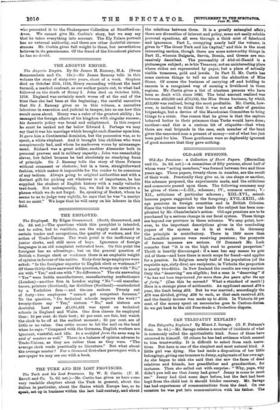OLD-AGE PENSIONS.
Old-Age Pensions : a Collection of Short Papers. (Macmillan and Co. 2s. 6d. net.)—A committee of fifty persons, about half of whom were " acting members," was formed between two and three years ago. These papers, twenty-three in number, are the result of their work. Practically they give us, in one shape or another, the schemes proposed, the experiments made, and the criticisms and comments passed upon them. The following summary may be given of them :—I.-III., schemes; IV., common errors ; V.- XLI., criticisms of particular schemes ; miscel- laneous papers suggested by the foregoing ; XVH.-XXIII., old- age pensions in foreign countries and in British Colonies. Since the volume came into our hands the subject has been com- plicated by Mr. Chamberlain's action. Old-age pensions are to be purchased by a serious change in our fiscal system. These things are beyond our province in these columns. We may point, how- ever, to the important descriptions given in the concluding papers of the system as it is at work. In Germany the principle is contributory. There in 1899 more than half-a-million persons were receiving pensions ; the prospects of future increase are serious. Of Denmark Mr. Loch remarks that "it is on the high road to general pauperism." Thrift is heavily discouraged : if a man has any means he gets rid of them—and here there is much scope for fraud—and applies for a pension. In Belgium nearly half of the population (of the requisite age, sixty-five) are recipients; in Victoria the proportion is nearly two-fifths. In New Zealand the results are very curious. Only the " deserving " are eligible ; but a man is "deserving" if "he has not been imprisoned for more than five years after the ago of forty." (Can this be correct? What a standard of merit!) Here is a strange piece of arithmetic. An applicant earned £78 a year, the limit being £52. But he was married ; accordingly the £78 was divided, giving £39 to each, so that each received £13, and the family income was made up to 21104. In Victoria 33 per cent. of the money spent on necessaries goes to Custom-duties. So we get back to the old Free-trade v. Protection dispute.






















































 Previous page
Previous page